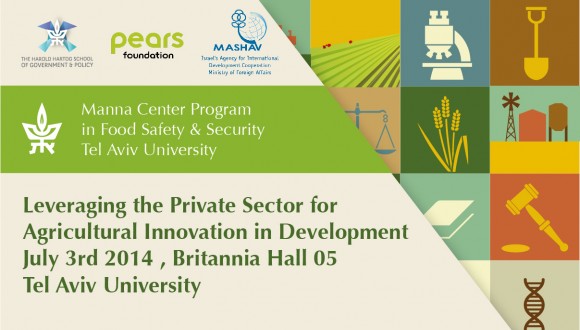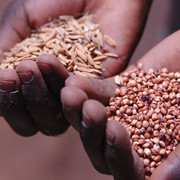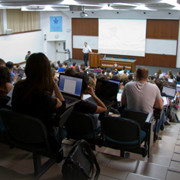2014 Conference
On July 3rd, the Manna Center for Food Safety and Security at Tel Aviv University in collaboration with the the Pears Innovation for International Development Program and MASHAV – Israel’s Development Agency, organized a conference on the topic of Leveraging the Private Sector for Agricultural Innovation in Development.
The opening remarks were given by Member of Knesset Professor Avishay Braverman.
Please click here to listen to the welcoming words and opening remarks >
Thoroughout the day over 120 people attended the three panels. Click on the tabs above for the schedule of the day, and the biographies of our wonderful speakers.
Each of the three panels addressed different perspectives of this issue, and gave a broad idea of the advantages of working in collaboration with the private sector. It also raised important ethical and practical issues in doing so.
Panel 1: Public Private Partnerships (PPPs) approaches and perspectives for developing, adapting and disseminating technologies: why, how and when not?
This panel discussed the power to “do good” that the private sector has in its hands as well as emphasized the importance of integrating the different actors of development in projects that have common interests and complementary goals. We heard about the strength of putting resources together and leveraging each of the sectors to enable the adaptation of new technologies by smallholder farmers. The adaptation of various technologies is such a complex process that it needs a complex answer; therefore the PPPs can be a good solution. We had the perspectives of a government actor having a specific PPP program, an expert in PPPs working for an international organization, a funding body for private sector initiatives in developing countries and two different private sector companies, one Turkish and one Israeli working with smallholder farmers.
To view Panel 1 in its entirety, please click here >
Panel 2: Ethical perspectives: How can the interests and needs of smallholder farmers be safeguarded? How should patent and intellectual property issues be dealt with?
This panel engaged in a discussion around how the private sector that deals with genetic engineering can be convinced to get involved with smallholder farmers in Africa to solve the needs that are specific to the continent, while still meeting the needs of the industry, ie profit. The issues of non transgenic seeds, genes that are not appropriate to the needs of the smallholder farmers in Africa were tackled. The panel also discussed the importance of using the patenting of new genes through licensing as a leverage to bring to the smallholder farmers and enhance the creation of new appropriate ones.
To view Panel 2 in its entirety, please click here >
Panel 3: Local entrepreneurship and Agribusinesses- What policies to foster local initiatives and entrepreneurship? How can the efforts of NGOs, governments and donors be best harnessed to support local agri-entrepreneurship?
Technoserve and Grameen Foundation presented different models of ways to foster entrepreneurship among smallholder farmers through new technologies and systemic approaches. The projects look at the complexity of the value chain and tackle the problems using a diversity of actors to address this challenge. The aim is to help the smallholder farmers to move from subsistence farming to successful commercial suppliers. We heard about the obstacles of this shift from the viewpoint of various research- based findings.
To view Panel 3 in its entirety, please click here >





